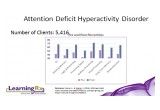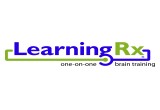LearningRX Provides New Information-Based Report for National ADHD Month

Colorado Springs, CO, August 29, 2016 (Newswire.com) - - LearningRX, the largest one-on-one brain training organization in the world today released a new report detailing findings that may help those suffering from learning obstacles such as ADHD.
The report, released in honor of National ADHD Month, in September, discusses that training one specific skill—such as attention—isn’t enough because ADHD learning struggles may be rooted in clusters of weak cognitive skills. ADHD is a common behavioral disorder that affects about 10% of school-age children.
We found that most of those students, in addition to weak broad attention skills, had weak long-term memory, processing speed and working memory
Tanya Mitchell, LearningRx Vice President of Research & Development
“Close to 30% of our clients were diagnosed with ADHD before coming to one of our centers,” said Tanya Mitchell, Vice President of Research & Development for LearningRx . “We found that most of those students, in addition to weak broad attention skills, had weak long-term memory, processing speed and working memory.”
According to LearningRX, cognitive skills can be targeted with personal brain training, which incorporates immediate feedback, intensity and loading, among other features, to train those weaker skills.
Over a six-year period, LearningRX had 5,416 children and adults come to one of its centers with the diagnosis of ADHD, The organization measured the cognitive performance of these clients before and after brain training, and the largest gains were seen in IQ, auditory processing, long-term memory and broad attention. After LearningRx brain training, IQ scores improved by an average of 15 standard points, and broad attention skills improved an average of 24 percentile points.
As the chart above indicates, most of the clients who had been diagnosed with ADHD had very low pre-training processing speed (33rd percentile), long-term memory (34th percentile) and working memory (38th percentile). But after one-on-one brain training, all of these skills improved.
“Every person is unique, so there’s no guarantee everyone will have these exact measured results,” said Mitchell. “However, we’re not talking about a small handful of people. These are the results of more than 5,400 clients, which provides some of the largest data to-date on the impact of one-on-one brain training.”
The full results can be found on page 25 of LearningRx’s 48-page 2016 edition of “Client Outcomes and Research Results
Weak cognitive skills are to blame for most learning struggles however these brain skills can be trained to make learning easier and faster. These results provide significant insight into why one-on-one brain training works best on attention struggles when multiple cognitive skills are targeted. LearningRX found similar results with other learning struggles among its over 95,000 graduates. Although one weak cognitive skill in particular may be steering the direction of the learning struggle, other brain skills are usually weak. The good news is, once the organization can identify which cognitive skills are weak, it is able to customize a program to train those skills.
Parents are often the first to notice when their child is struggling, it’s often helpful for them to know the warning signs of a cognitive skills weakness so they can recognize them and have their child’s brain skills assessed. To start, parents can take this free online survey by clicking HERE
Founded in 2002, LearningRx, , is the largest one-on-one brain training organization in the world. With 80 Centers in the U.S., and locations in 40 countries around the globe, LearningRx has helped more than 95,000 individuals and families sharpen their cognitive skills to help them think faster, learn easier, and perform better. Its on-site programs partner every client with a personal brain trainer to keep clients engaged, accountable, and on-task—a key advantage over online-only brain exercises. LearningRX’s pioneering methods have been used in clinical settings for 35-years and have been verified as beneficial in peer-reviewed research papers and journals. To learn more about LearningRx research results, programs, and their 9.6 out of 10 client satisfaction rating visit http://www.learningrx.com/ or engage them on Facebook: facebook.com/learningrx/
Source: LearningRx


